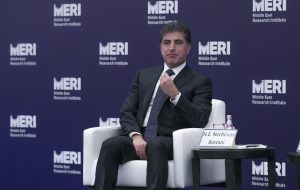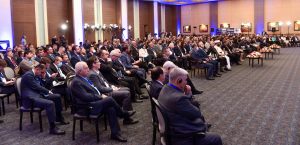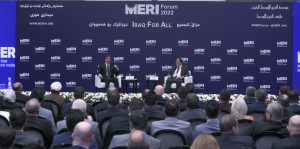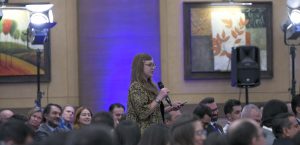Making Iraq Work for All
Summary Report and Session Video
- Nechirvan Barzani, President of the Kurdistan Region of Iraq
- Farhad Alaaldin, Chairman, The Iraqi Advisory Council
This session at MERI Forum 2022 was designed to debate the challenges of ‘making Iraq work for all’, from the perspective of the Kurdistan Region of Iraq (KRI) and its President (click here for video of the session in full). The panel moderator, Farhad Alaaldin, focused the discussion on the political dynamics in Iraq and the KRI, and their relations with the neighbouring countries and other global partners. Here, instead of presenting a transcript, the key messages are summarised and presented. However, the entire debate is included in the video link.
Farhad Alaaldin pointed out that four days earlier a new government took office in Baghdad, which came after a year of political deadlock. People seem are hoping that the government will be able to implement its 29-page long manifesto. The KRI’s main political parties are involved in the new Cabinet. He then asked, “How does the President of the KRI look at the government of Mohammed Shia al-Sudani and what support can the Region offer him and vice versa?”
Summary of the President of Kurdistan Region (PKR)’s response:
- The very formation of this government was an important step for the current situation in Iraq. The KRI wants to seriously help the new Iraqi Prime Minister and his cabinet to succeed, because if Iraq is stable, the KRI will be stable. Conversely, if the security situation in Baghdad deteriorates, the KRI will also deteriorate. Obviously, everyone’s circumstances are interconnected.
- As the main topic of today’s conference is whether Iraq is working for all? Do Iraqis really feel that Iraq is for everyone? I guess the answer is pretty simple – no- people do not have that feeling which must be developed. We must learn from all these mistakes of the past few years. Baghdad has tested itself and the KRI has tested itself. In the end, we have reached a critical point.
- What the KRI demands is that issues be resolved in accordance with the Iraqi Constitution. The question is: what system is governing Iraq? Is it a centralized or a federal one? The Iraqi Constitution defines the system as ‘Federal’, but does Iraq actually have a federal system? The answer is simply – no. unfortunately a strong centralising mentality has ruled this country. We have to start over and I don’t think it’s too late. If we take the problems between the KRI and Baghdad seriously and find a solution, Iraq will be in a good situation.
- So far, we have spoken to the new prime minister several times on the phone and he deserves to be supported and given the opportunity to find solutions to Iraq’s problems.
- If we all abide by the Iraqi constitution, the problems will be solved, not by strong and weak logic. We must find a formula for how to live together in a geography called Iraq.
- Iraqis deserve better than they do now and there is room because Iraq is a rich and potential country that can become a leader in the entire region. The demands of the demonstrators are very legitimate and they want the country to improve, have job opportunities and have a better life. Iraqis deserve it.
Farhad Alaaddin: The process of forming the government took a year. During that year, there were demonstrations, several decisions of the Federal Court and the occupation of the parliament. This process cannot continue like this. Will the future elections be the same or are we likely to go beyond this political system? Shouldn’t the handover of power be smooth and peaceful?

Summary of the PKR’s Reply:
- Democracy is not a gift that can be given and implemented immediately. This has become our culture since 2004. We have made a lot of progress, but we still have a lot to do. The issue of Iraq is much more complicated than securing a parliamentary majority and forming a government. Iraq is in a transitional phase and there is much to do.
- This current government has the support of Shiite, Kurdish and Sunni parties, so our expectations for solving Iraqi problems are higher and the responsibility lies on the shoulders of the Prime Minister is much greater than the previous ones.
Farhad Alaaldin: Since the adoption of the constitution, outstanding issues have been constantly suspended. Each year the budget is carried forward to the following year, including final accounts, revenues from customs, oil and gas. Article 140 is only mentioned as a government pledges during elections and later forgotten after the formation of the government. How can these problems be resolved and a new horizon opened?
Summary of the PKR’s Reply:
- Since 2004, during the formation of any previous government in Iraq, we never signed a written agreement with the Prime Ministers. This is the first time. All these issues have been agreed upon and some time limits have been set.
- How long does Baghdad think that these problems will remain unresolved? Does Baghdad want a politically, economically and economically stable Iraq? The first condition is that the issues with the KRI must be resolved. The KRI wants to solve the problems. Today, the voice of the KRI is a big voice, perhaps small in size, but it is a big voice regionally and internationally. It is not right for Baghdad to underestimate the KRI. What the KRI is demanding is not a big deal, but something it wants to solve according to the constitution.
- Our way of thinking about oil and gas is very different from that of Baghdad. Unfortunately, when oil is discussed in Baghdad, it is always linked to the issue of Iraqi sovereignty. We do not want to violate Iraqi sovereignty, nor do we intend to. We regard oil and gas as a commodity and we want it to serve the Iraqi citizens and help serve the entire people. Kurdistan’s geographical situation is very complicated and oil cannot bring independence to Kurdistan, it can only bring welfare to the citizens of the KRI.
- Baghdad must change its views on the KRI and accept that the KRI is Baghdad’s main partner. Yes, we are making the burden on these Prime Ministers very heavy, because we see this government as one of our last chances to resolve the problems that exist between Baghdad and the KRI.

Farhad Alaaddin: Your words seem to be that the blame lies with the Baghdadis, not with the Kurds, but there is a fact that the Kurds have always had a very strong position in Baghdad. In 2010, they were able to change the Prime Minister. When they insisted that Ibrahim Jaafari must not become Prime Minister again, or Mahmoud al-Mashhadani not remain as Speaker of Parliament, they succeeded. That is only because the Kurds were united. In the past, the Iraqi parties were jealous of the Kurds because they had problems in the KRI, but when they came to Baghdad, they were united. But now the Kurds are divided. After the recent elections, the two Islamic parties are neutral and have no votes at all; Nawa-i-Nwe moved towards Imtidad; The KDP went with the National Salvation Alliance and the PUK with the Coordination Framework (CF). Each demands Kurdish rights differently. If the Kurds are so divided, how can Baghdad listen to them? Why don’t you negotiate with 64 seats and insist on imposing Kurdish rights? How much damage do you think we have done from this division?
Summary of the PKR’s Reply:
- My earlier statements were not to blame Baghdad. I said that we must learn from the mistakes of the past and, in my opinion, we have another opportunity today to correct the mistakes. This does not mean that I blame Baghdad unilaterally and that we have nothing wrong with it. We must sit down and say that we have a constitution. According to this constitution, this is our duty and this is our right. We want to fulfill our duties and demand our rights.
- The division in the KRI has not only caused great damage to the Kurds, but also had a very bad impact in every way. If we are united in Baghdad, we will be stronger and carry more weight. The agreement we have with CF, the two main parties in Kurdistan have signed this together. Although we have gone to one side in tactics, we have agreed on strategy and demanded our rights together.
Farhad Alaaldin: Turkey has entered the KRI today. They have established between 70 and 350 military bases; their drones constantly bombard Kurdish areas and Kurdish and non-Kurdish citizens are killed. Iran is shelling the border and has brought troops to the borders. Erbil is being hit by ballistic missiles. In a silent Iraq, how can you as the KRI, the KRI Presidency and the Kurdistan Regional Government (KRG) and as political parties use the important and prominent positions you command to protect the region? The Region is under threat. The Iranians have said they will enter the KRI if their conditions are not met. When Turkey or Iran enter the KRI, the KRI will not be able to prevent them. It is the job of the Iraqi government, which has been really silent in the past. What programs and capabilities do you have to protect this small region?
Summary of the PKR’s Reply:
- We must ask our brothers in Baghdad this important question. When it comes to violating sovereignty, this is a clear violation.
- We have always followed a principle: we do not want the KRI to become a source of problems for our neighbors. We have tried and worked hard. But what our neighbors are doing is exactly what Iraq must take very seriously, which it has not yet done. Our proposal to Baghdad was to form a joint committee to discuss this issue, because this is primarily related to Iraqi sovereignty and Kurdistan’s security. Kurdistan’s security is also related to the security of Baghdad. But so far, nothing has been done in Baghdad.
Farhad Alaaddin: The Kurdish parties have been struggling for decades building what they now have, but are about to destroy it themselves. People are dissatisfied with the political problems between the green and yellow zones. There used to be fratricide between the green and yellow zones, but not as bad as it is now. Foreign diplomats say to us “You are tarnishing your brand,”. It must be said that you have made a lot of efforts to bring together the political parties, but what do these Kurdish political parties that are now in power in Kurdistan want to do in the region?

Summary of the PKR’s Reply:
- There should be no green and yellow zones. There should be a Kurdistan zone. This term should not be used because it is to weaken the position of the KRI.
- The PUK has been, and will remain, the main partner of the KDP in the political process. Yes, there are problems that need to be addressed before they get bigger. I’m optimistic. I have done what I can to solve these problems. We must both sit down, admit our mistakes and formulate a common understanding of how to run this country. Neither the KDP is an alternative to the PUK nor the PUK is an alternative to the KDP. We complement each other. Other parties also play a role in this process. We must all bear each other’s burdens and we will surely find a solution
Farhad Alaaldin: The Vice President says very frankly, and with a heavy heart ,that there are two administrations in Erbil, where no one knows who the force that surrounded the Deputy Prime Minister’s house were. That’s the problem. You were known here as the prosperity engineer. When Kurdistan came under siege in 2017, you became a diplomatic engineer. Yes, Mr. Qubad was with you when you worked hard to lift the blockade and you were able to make the KRI breathe. Now how do you use your engineering skills to put them into practice?
The process of writing a Constitution for the KRI has been suspended. Constitutions regulate the judiciary, executive and legislative powers and govern the democratic process. Why not finalise the Constitution so that the political parties cannot manipulate the date of a constitutional election at will, while their own legitimacy stems from the election?
Summary of the PKR’s Reply:
- We have made great efforts to hold the elections on time and as the President of the KRI, I have implemented all the actions that have been on my shoulders. I have set the date by writing a letter to the Kurdistan Parliament, but unfortunately the parties did not reach a conclusion on many meaningless things. It was not necessary for the parties to disagree on who would win which seats. Consequently, the job of the parliament is to work together to pass good laws for the KRI. We as the KDP once had thirty seats and now we have forty seats, but we were much stronger before than we are now because we had a strong lobby in parliament and worked together.
- The KRI must have its own Constitution that should be compatible with that of Iraq. We will not do anything different. I think if the KRI remains like this, one day the Supreme Federal Court may issue a decision saying why you do not have a constitution and you should have one. Now the ball is in the Parliament’s arena. We will provide them with all the facilities. Now they have started again in parliament and we hope that during the extension of Parliament, we can have a constitution for the next elections that can solve the problems.
Farhad Alaaldin: The process of Peshmarga reunification has not been going well. For how long should we keep the 70th and 80th forces, or separate anti-terror forces and other political party based military forces? Instead of making them an institution under the command of the KRG. These are among the biggest criticisms of the international community. How can you move this process forward?
Summary of the PKR’s Reply:
- We must look at the problems very realistically. We have started the process. Yes, it is going very slowly, but it is not true to say that nothing has been done, because things have improved and the process has moved forward, but it is not complete. On two occasions, in Sulaymaniyah and in Zakho, I have explained everything about my responsibility very clearly.
- Our partners in the Coalition Forces are seriously helping to get this Peshmerga reunification process on track. Their pressure is out of loyalty to the KRI and they want the forces to unite and have no problems.
Farhad Alaaddin: In the previous panel, Mian Khairi Beg said that you played an important role in rescuing a large number of our Yezidi sisters from the hands of ISIS. But so far, as we have heard, they have many problems. An agreement was reached on the issue of Sinjar under the auspices of the United Nations. The issue of Sinjar has regional and international depth and involves a lot of interferences. Baghdad is also involved in this process and may be partly responsible for its failure to implement it. How do you respond to these demands and how can the agreement be implemented in order to calm the situation in Sinjar and to some extent the coast of Nineveh?

Summary of the PKR’s Reply:
- What we have done was our duty. Even though we haven’t done it at all, we apologize to the our people. Unfortunately, the Yezidis have been subjected to many genocides in history. Since 2014, they have not been properly engaged to solve their problems. Their suffering is great and their wounds are deep. The issue of the Yazidis should not be politicized. This community is about to be destroyed and they are forgetting their religious and ethnic heritage. Migrating is not the solution for this nation.
- This community has lived in this country before any other religion emerging, and has endured all hardships. They want to live in peace with all other communities.
- In the Sinjar Agreement, as the Governor of Mosul pointed out, he was not consulted. I really want to thank the Governor here. The Yazidi and Christian brothers spoke about his role very highly and I want to thank him on behalf of the KRI.
- The Sinjar Accord is an agreement between the KRI and Baghdad, but there is still no strong will from Baghdad to implement it. To lay the foundation of mutual trust, the agreement must be implemented as it is. We are ready to do what is on the KRI. The external forces must leave. The forces that are there have produced nothing more than problems and caused more suffering for the Yazidi people.
- As for the Shiites and Christians, we hope that those in the camps and those outside will return to the area. We hope that a limit will be set for these forces that are outside the law and have weapons in their hands and create problems for that border. We all expect the current Iraqi government to be able to solve these problems
In response to questions from the audience, President Nechirvan Barzani conveyed the following messages:
- Regarding the Sadrist movement, we have great respect for Sayed Muqtada Al-Sadir and we believed that the movement’s participation in the political process in Iraq is necessary. I think that the new government must make every effort to convince the brothers in the Sadir movement to participate in, and support, the government. I think it is the duty of all of us to support this government in Baghdad.
- The oil issue is very complicated. The first thing Turkey has done was to help the KRI. When they gave us permission to build an oil pipeline from the KRI to the Cihan port, it was a help to Iraq and the KRI. Taking this issue to international arbitration will not solve the problems between Iraq and Turkey. If Iraq thinks that taking the file to an international court will solve the problem, it will not. We are neighbors and key partners. I call on the Baghdad government and the current Iraqi prime minister to be very realistic about this issue. Consequently, we must do something that is both good for Turkey and good for Iraq, including the KRI, because otherwise it will certainly lead to worse things and, in my opinion, Iraq will suffer a big loss. This issue must be resolved peacefully and through dialogue between Turkey and Iraq. We are ready as the KRI. Let us play a key role in this work.
- If the new Iraqi government abides by the Agreements we have made with Baghdad to form a government, if we have an oil and gas law, and if we have a revenue sharing law, we will not need this arbitration, because we will honour our duties and secure our rights.

